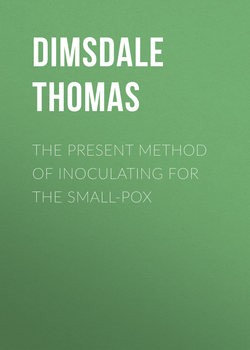Читать книгу The Present Method of Inoculating for the Small-Pox - Dimsdale Thomas - Страница 6
Of Anomalous Symptoms and Appearances
ОглавлениеIn the preceding pages I have described the usual progress of the small-pox from the inoculation. There are, however, deviations from this course, and indeed not a few; some of the most material of which, as they may embarrass the inexperienced, and create a real difficulty, as well as apprehensions of danger, it seems necessary to describe, and to point out the means that experience has suggested to remove these symptoms, or the doubts respecting the event.
The first I shall take notice of, and which, though it very rarely happens, sometimes gives much trouble, is great sickness, accompanied with vomiting, coming on during the eruptive state of the distemper. For this complaint it is always necessary in the first place to clear the stomach; which may be effected, either by ordering the patient to drink plentifully of warm liquids to promote vomiting; or, perhaps more properly, by given one grain of emetic tartar to an adult, mixed with ten grains of compound powder of crabs claws; taking care to lessen the dose for very young and weak subjects.
This usually throws off some bilious matter by vomit, sometimes procures stools, or occasions a moderate sweat, and generally administers relief. If, however, no stools should follow from this medicine, and the sickness should remain, a gentle laxative almost certainly procures a respite, and the appearance of the eruption removes the complaint intirely.
Another deviation, of still more consequence, which sometimes happens towards the time of the eruption, and is often, though not always, accompanied with great sickness, is an erysipelatous efflorescence. This, if it shews itself on the skin partially, and here and there in patches, is not very alarming, and soon wears off.
But sometimes the whole surface of the skin is covered with a rash intimately mixed with the variolous eruption, and so much resembling the most malignant kind of confluent small-pox, as scarcely to be distinguished from it: and indeed some cases of this sort have happened, where, being accompanied with petechiæ and livid spots, I have been much alarmed; not being able, by inspection only, though assisted by glasses, to determine whether what I saw was an inoffensive rash, or tokens of the greatest malignity. Very strict attention, however, has enabled me to distinguish the difference clearly; and the following observations will, I hope, tend to relieve others from the anxiety they would feel upon such an appearance.
The real and essential difference then is to be gathered from the concomitant symptoms. In the erysipelatous or variolous rash, there is not so much fever, nor is the restlessness, or a pain of the head or loins, so considerable; neither is there that general prostration of strength, which are almost never-failing attendants on a confluent small-pox, especially when accompanied with such putrid appearances. Besides, upon a careful examination, there may sometimes be discerned a few distinct pustules, larger than the rest, mixed with the rash, which are indeed the real small-pox. In these cases the patients are ordered to refrain from cold water, or any thing cold, and to keep within doors, but not to go to bed. If any sickness yet remains, a little white-wine whey, or other moderate cordial, is advised; and this method has hitherto been so successful, as to prevent any alarming complaint. After two or three days, the skin from a florid changes to a dusky colour, a few distinct pustules remain, and advance properly to maturation, without any further trouble ensuing from this formidable appearance1.
This rash has often been mistaken for the confluence it so nearly resembles, and has afforded occasion for some practitioners, either ignorantly or disingenuously, to pretend, that after a very copious eruption of the confluent pox, they can by a specific medicine discharge the major part of the pustules, leaving only as many distinct ones as may satisfy the patient that he has the disease. Such pretensions have certainly been made; and the patient, who has been deceived in this manner, has contributed to spread reports untrue as to the fact, and probably prejudicial to the health of others, who in like circumstances have been sent into the open air, by which, and other cool means, the rash has been repelled, and the bad effects experienced afterwards.
I must also observe here, that rashes of the kind I have described frequently happen during the preparation (whether owing to the regimen, or medicine, or both, I cannot say) and cause the operation to be postponed: and I have observed, that in such cases they are apt to return at the time of the eruption of the small-pox.
In general, as has been already said, the symptoms which precede eruption commence at the end of the seventh, or in the eighth day, inclusive from the operation; but it often happens that they appear much sooner, and sometimes much later, than the time above-mentioned. For instance, I have seen some cases wherein the disease has happened so suddenly after infection, and with so little complaint or uneasiness, that the whole affair has been terminated, purges taken, and the patient returned home perfectly well in a week’s time; before others, inoculated at the same time, from the same patient, and under the same circumstances, have begun to complain.
1
See Cases XIII. XIV.
